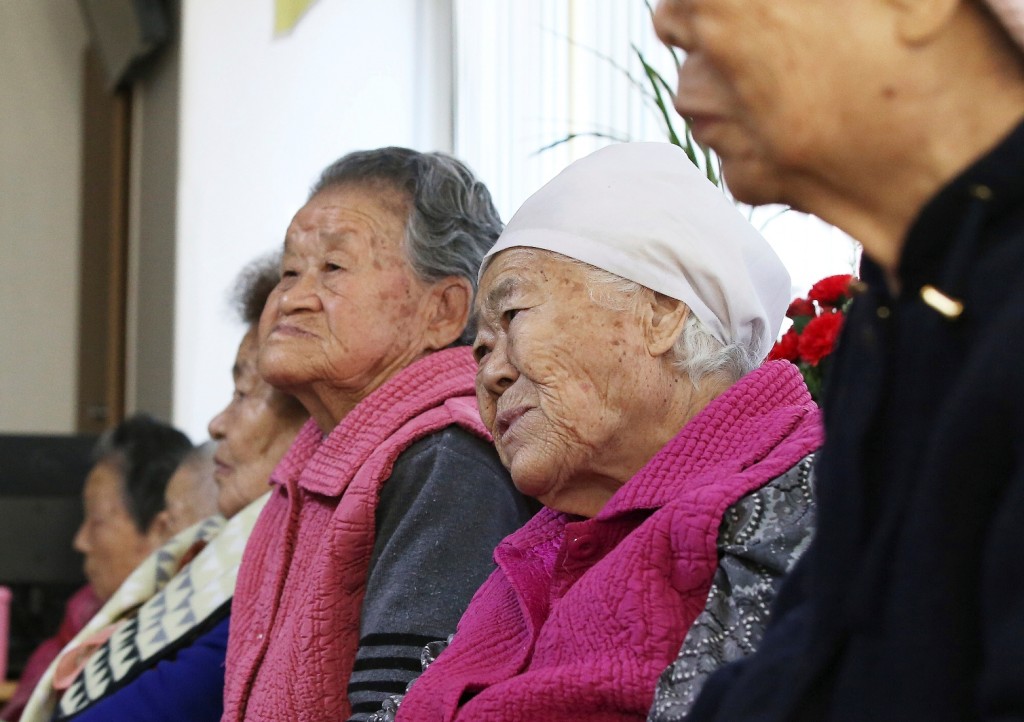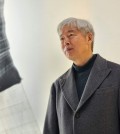- California Assembly OKs highest minimum wage in nation
- S. Korea unveils first graphic cigarette warnings
- US joins with South Korea, Japan in bid to deter North Korea
- LPGA golfer Chun In-gee finally back in action
- S. Korea won’t be top seed in final World Cup qualification round
- US men’s soccer misses 2nd straight Olympics
- US back on track in qualifying with 4-0 win over Guatemala
- High-intensity workout injuries spawn cottage industry
- CDC expands range of Zika mosquitoes into parts of Northeast
- Who knew? ‘The Walking Dead’ is helping families connect
Sex slavery deal draws backlash

Former South Korean sex slaves, who were forced to serve for the Japanese Army during World War II, wait for results of a meeting of South Korean and Japanese foreign ministers at the Nanumui Jip, The House of Sharing, in Gwangju, South Korea, Monday, Dec. 28, 2015. The foreign ministers said Monday they had reached a deal meant to resolve a decades-long impasse over Korean women forced into Japanese military-run brothels during World War II, a potentially dramatic breakthrough between the Northeast Asian neighbors and rivals. (Hong Ji-won/Yonhap via AP)
By Kim Se-jeong
The landmark deal between Korea and Japan over the sexual slavery issue is triggering a backlash from civic groups and the victims of Japan’s wartime atrocities.
On Monday, Foreign Minister Yun Byung-se and his counterpart Fumio Kishida announced that the Japanese government would pay 1 billion yen ($8.3 million) to establish a fund for the 46 surviving former sex slaves.
They called the agreement “final and irreversible” on condition that Japan fulfills its promises.
However, the failure of Japan to state its legal responsibility for the victims is raising skepticism about the sincerity of the Japanese government.
The surviving former sex slaves criticized the Korean government for failing to communicate with them before hastily striking the deal with the Japanese government.
“I do not buy this deal,” said Yoon Mee-hyang, head of the Korean Council for Women Drafted for Military Sexual Slavery by Japan, an NGO which organizes a weekly protest in front of the Japanese Embassy in Seoul.
“This issue can’t be resolved without the voices of the victims being heard. But, the negotiations took place only between the two governments. We will continue to campaign and explain why the agreement is invalid.”
She expressed particular anger at the foreign ministry for a lack of communication beforehand, saying the government never talked to the victims her organization takes care of.
“The government says the agreement is irreversible and the victims cannot raise even a question about the issue. The ministry is infringing on individual victims’ rights and it is unconstitutional,” Yoon said.
The ministry sent two vice ministers to Yoon’s organization and to the House of Sharing, a shelter for the victims in Gwangju, Gyeonggi Province, to brief them about the agreement, Tuesday.
Lee Yong-soo, 88, one of the victims, said, “Throwing out money and asking us to forget the past, that’s disgusting. I am sure all the victims who have passed away would agree with me.”
The Korea American Forum of California, a U.S.-based civic group, joined the condemnation.
Kim Hyun-jeong, the forum’s president, said, “Korean victims are one of many. It appears that Japan is trying to put a lid on other victims around the world through this. Also, I feel that Japan is behind the quickly spreading news around the world so that this issue will be buried forever.”
But some recognize the agreement, saying it’s time to move on.
“It is recognizable that Japanese Prime Minister Shinzo Abe apologized,” a member of the Citizens United for Better Society said.
A college student, surnamed Lee, said, “It is positive that Japan is showing a more mature attitude than before. It is regrettable that they failed to mention their legal responsibilities, but if Japan is sincere in carrying out the follow-up measures, I think the victims and the public should accept the agreement.”
An Internet user also said, “I think it was good that Korea grabbed the offer from Japan, which used to be adamant on its stance. It’s time to leave the past behind and build a more constructive future for the two nations.”
















Kris
December 29, 2015 at 1:55 PM
Since Japan wants the comfort women statues removed it is clear they are not owning up to what they have done.
Horangih Gomtoki
December 29, 2015 at 2:17 PM
This deal happened because US put pressure on Japan and South Korea. US sees Japan and South Korea as its political puppets. Politically, Japan and South Korea have no sovereignty. They must do as US orders them. In contrast, China(allied with Russia) is an independent sovereign nation. US cannot push China around. So, US feels hostility toward China. US hates Russia also because Russia is also politically independent.
But US sees Japan and South Korea as its whore-dogs. Because of the tension between China and Japan, Japan moved even closer to the US in recent yrs. And US wanted South Korea to stick close with Japan. But due to historical controversies, South Korean relations with Japan became bitter. China took advantage of this and tried to drive a wedge between Japan and South Korea. So, it looked like Japan was moving closer to US while South Korea was moving closer to China.
US took notice of this, and it put pressure on Japan to apologize and put pressure on South Korea to accept the apology. That way, Japan and South Korea are once again back in the fold as loyal dogs of the US empire.
But we need to raise some other issues. Why does South Korea still bring up the issue of Comfort Women but never bring up the issue of how Korea was divided in the first place? Korea was not divided by Japan. It wasn’t divided by Koreans themselves. It was divided by the US when it cut a deal with the USSR to slice Korea in half. This was a great crime against an innocent-victim nation. And it set the grounds for the Korean War in which 3 to 4 million Koreans died, many by indiscriminate US bombing of civilians.
US has never taken responsibility for what it did or ever issue an apology.
If the Comfort Women issue is still relevant to us, why isn’t the Division of Korea an issue that needs to be addressed? Shouldn’t the US admit to what it did? Shouldn’t there be an apology about this? And shouldn’t US admit to massive bombing of Korea that may have killed over a million people?
Japan did bad things in the past, but it lost the war and has no control over South Korea. In contrast, US still uses South Korea like a colony.
Another thing. Koreans want to believe that those ‘comfort women’ were pure innocent victims of Japanese imperialism. In other words, the narrative implies that Korean women are so virtuous that they wouldn’t have volunteered to become prostitutes. They were FORCED to be prostitutes.
But look at Korean history under US occupations. Millions of Korean women prostituted themselves to US soldiers. Willingly too. And Korean girls and Korean-American girls now willingly dress, talk, and act like street sluts and whores. K-pop is a celebration of the hooker and slut, of puerile materialism and narcissism. Koreans condemn Japan for having forced Koean women to serve as prostitutes, but Koreans have freely acted as prostitutes for Americans over several decades. And Korean pop culture industry now promotes the cult of the sleazy whore and the decadent homosexual, and Korean girls and especially Korean-American girls have the reputation for filth and sleaze. They freely act like whores. And Korean boys now put on makeup and act like sissies.
Another thing. While Japan did something terrible to those women, Korean society and culture must also take responsibility for neglecting these women and blaming them for what happened to them. But there is a long tradition in Korean/Asian society of blaming the women even when they were the wronged party.
Chiu Kok-cheong
December 29, 2015 at 8:28 PM
What I have read about these unfortunate women, totally over 400,000 of
them in Asia enslaved by the Imperial Japanese Army, clearly expresses
that many of these young women were innocent, decent and docile girls,
including many students who were ruthlessly grabbed and forced into sexual slavery before and during World War II.
After the war, Japan was ravaged, Japanese people impoverished. Many
Japanese women served as prostitutes to American soldiers for their
livelihood. By the same token, many Korean women were lured into prostitution as the only source of their livelihood. In both countries
these women were purely the victims of the disastrous circumstances.
Should we blame them or feel sympathetic with them?